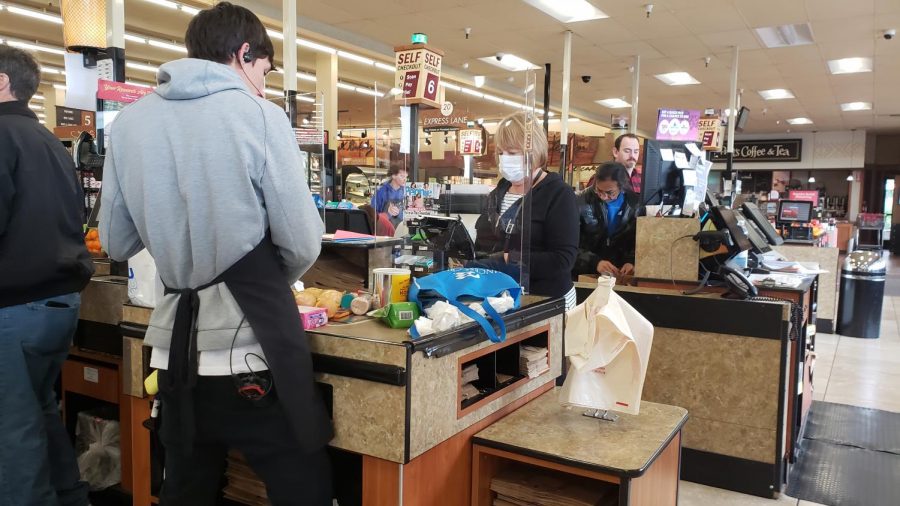Essential workers voice concerns for cleaner working conditions during pandemic
Employees from various businesses strike as working conditions continue to grow more unsafe
A grocery worker checks out a customer at a Raley’s in Carmichael, Calif. on March 20, 2020. With residents in Sacramento living under quarantine, only essential businesses like Raley’s Supermarkets are open while taking protective measures. (Photo by Ashley Hayes-Stone)
With the coronavirus affecting all buinssses around the world, some employees who are still working aren’t happy with the current work environment. Some employees from Amazon, Instacart, Kaiser Permanente and other businesses decided to go on strike to demand better working conditions during the pandemic.
Amazon and Instacart employees went on strike at the end of March, asking for better pay, paid sick time and more cleaning procedures since they are working during an extraordinary time.
Not all workers, however, feel the same about going on strike, even with current events. Jessica Smith, an Instacart employee, says she doesn’t agree with the strike.
“I don’t see the point going on strike, especially in this line of work,” Smith said. “There is always someone waiting to take your position.”
These strikes and protests go further than just Amazon and Instacart. According to an article published on March 25 by NBC, others are speaking out against Kaiser Permanente after the company threatened to fire its nurses for wearing their own masks.
Raven Kauba, a resident of Sacramento, was one of the people who protested against Kaiser Permanente’s threats, saying that firing nurses for this reason puts everyone at risk.
“Nurses’ lives matter, their family’s lives matter, and the lives of other people in the community matter,” Kauba said. “Threatening to fire or suspend workers for speaking out about this is fear mongering and negligence … the nurses [are] vital to a patient’s survival. It’s counterproductive and negligent to make nurses sick and spread this disease.”
Temple Coffee is another business that’s also facing backlash from their employees. According to a Temple Coffee employee, who wishes to remain anonymous for fear they might lose their job, Temple Coffee sent out an email to their employees that read, in part: “Temple does not allow the use of masks in our cafes as it violates the dress code.” The email also said that employees can wear gloves while working “as long as they do not interfere with your job responsibilities.”
The anonymous employee said that workers didn’t organize any protests, but a number of them did speak up to the company on social media, since they weren’t happy with the email sent to them, and argued it would have a negative effect on the people who worked there.
“I think the effect on employees would have been more noticeable, with some employees quitting on the spot when the email came out, and others giving up all scheduled shifts because they didn’t feel comfortable working with the new rule,” the anonymous employee said. “Once quarantine ended or reduced, I think a lot of employees, myself included, would be looking to leave the company.”
Temple Coffee did send out an apology after the email was made public, saying that the email was misinforming to their employees. According to a letter to the employees by Sean Kohmescher, founder and owner of Temple Coffee, he has stepped down from his position after apologizing to their employees about the issue involving the masks.
“At this time, I feel it is in the best interest of our company for major transition in leadership,” Kohmescher said. “I will be stepping aside from my role within the company.”
Workers from all different types of businesses are speaking up right now given the current working conditions during the COVID-19 pandemic. Employees continue to argue their right to clean and safe working environments with a virus being spread worldwide.
“I’m proud of the workers striking right now and sending love and support to them,” Kauba said. “It should not have taken a pandemic to remind us that human life is sacred, and that everyone deserves safe working conditions and a liveable wage.”









